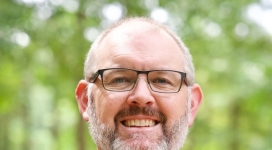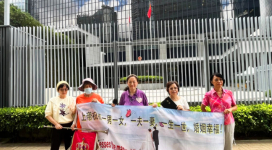NEW YORK - Human rights is not a "dirty word" nor is it a bomb, said a specialist in human rights and humanitarian issues at a panel discussion concerning North Korea Wednesday.
"It has to be seen as a legitimate subject," stated Roberta Cohen, senior fellow at the Brookings Institution.
Human rights activists, church leaders and individuals concerned with the atrocious human rights situation in the DPRK (Democratic People's Republic of Korea) sat in on a half-day discussion that tackled urgent issues of food security, religious persecution, refugees and the currently stalled six-party talks.
"All parties need to be ready to take human rights very seriously," said Chung Eui-yong, member of the National Assembly of the Republic of Korea, as a panelist on the topic of human rights being addressed in a comprehensive Northeast Asia security regime.
The timely gathering, co-sponsored by Asia Society, the United States Commission on International Religious Freedom and Refugees International, came as North Korea's violations of human rights has become a larger part of the U.S. agenda in recent months.
Early this month, six North Korean refugees were granted asylum in America - the first batch to be granted U.S. asylum under the North Korean Human Rights Act of 2004. A week before that, President George W. Bush had one of the most moving meetings since his presidency when he met with a family of North Korean defectors, a former North Korean soldier and the family members of the widely-reported Japanese abductee, Megumi Yokota.
Fumiko Saiga, appointed last year as Japan's first Ambassador in charge of human rights, drew attention to the abduction of Japanese nationals that has all of Japan and the world talking. North Korea had confessed to kidnapping 13 Japanese citizens in the 1970s and 80s, including Yokota who was only 13 years old then and whose mother Sakie believes is still alive. More reports on North Korea's abductions of persons from other countries including South Korea, Thailand and even Europe were also released, Saiga noted.
This is one issue that Japan has been addressing with high priority, said Saiga.
Jay Lefkowitz, U.S. Special Envoy on Human Rights to North Korea, who was present at the meeting between Bush and Sakie Yokota, announced yesterday that he has begun to work with Saiga on the issue of abduction, which he called a "vile act" and a "flagrant example of North Korea's lawlessness."
North Korea's unchanging human rights situation has become a more flagrant issue in the United States with increased accounts of the lives of North Koreans and their daily sufferings being exposed and published, including USCIRF's landmark report Thank you Father Kim Il Sung.
"Why is the United States focusing so much attention on North Korean human rights?" posed Lefkowitz as he addressed the panel attendants yesterday.
Along the lines of many human rights groups, Lefkowitz said placing human rights on the security agenda is "necessary."
"Does our silence not mute further atrocities?" he stated.
As several of the panelists had touched upon, Lefkowitz brought up the Helsinki Final Act as a kind of model for the Northeast Asian countries to draw from for the inclusion of human rights on the security agenda.
The Helsinki Act was signed by 35 countries in 1975 to promote cooperation between the United States and Canada, the Soviet Union and the countries of Europe. The accords also included respect for human rights as one of its main points.
Cohen highlighted the accords as a point in which human rights became a legitimate topic of discussion. Not seeking a "carbon copy" of the act, Cohen suggested referencing it as a springboard for talking about human rights issues.
Lefkowitz similarly stated that although the Helsinki Accords are not a perfect analogy, it still shows that "we can address security and human rights at the same time."
Nevertheless, "the international community should take action when there is time," Lefkowitz said, "before 'Hotel Pyongyang' comes out."







